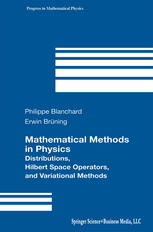

Most ebook files are in PDF format, so you can easily read them using various software such as Foxit Reader or directly on the Google Chrome browser.
Some ebook files are released by publishers in other formats such as .awz, .mobi, .epub, .fb2, etc. You may need to install specific software to read these formats on mobile/PC, such as Calibre.
Please read the tutorial at this link: https://ebookbell.com/faq
We offer FREE conversion to the popular formats you request; however, this may take some time. Therefore, right after payment, please email us, and we will try to provide the service as quickly as possible.
For some exceptional file formats or broken links (if any), please refrain from opening any disputes. Instead, email us first, and we will try to assist within a maximum of 6 hours.
EbookBell Team

0.0
0 reviewsPhysics has long been regarded as a wellspring of mathematical problems. Mathematical Methods in Physics is a self-contained presentation, driven by historic motivations, excellent examples, detailed proofs, and a focus on those parts of mathematics that are needed in more ambitious courses on quantum mechanics and classical and quantum field theory. A comprehensive bibliography and index round out the work.
Key Topics: Part I: A brief introduction to (Schwartz) distribution theory; Elements from the theories of ultra distributions and hyperfunctions are given in addition to some deeper results for Schwartz distributions, thus providing a rather comprehensive introduction to the theory of generalized functions. Basic properties of and basic properties for distributions are developed with applications to constant coefficient ODEs and PDEs; the relation between distributions and holomorphic functions is developed as well. * Part II: Fundamental facts about Hilbert spaces and their geometry. The theory of linear (bounded and unbounded) operators is developed, focusing on results needed for the theory of Schr"dinger operators. The spectral theory for self-adjoint operators is given in some detail. * Part III: Treats the direct methods of the calculus of variations and their applications to boundary- and eigenvalue-problems for linear and nonlinear partial differential operators, concludes with a discussion of the Hohenberg--Kohn variational principle. * Appendices: Proofs of more general and deeper results, including completions, metrizable Hausdorff locally convex topological vector spaces, Baire's theorem and its main consequences, bilinear functionals.
Aimed primarily at a broad community of graduate students in mathematics, mathematical physics, physics and engineering, as well as researchers in these disciplines.